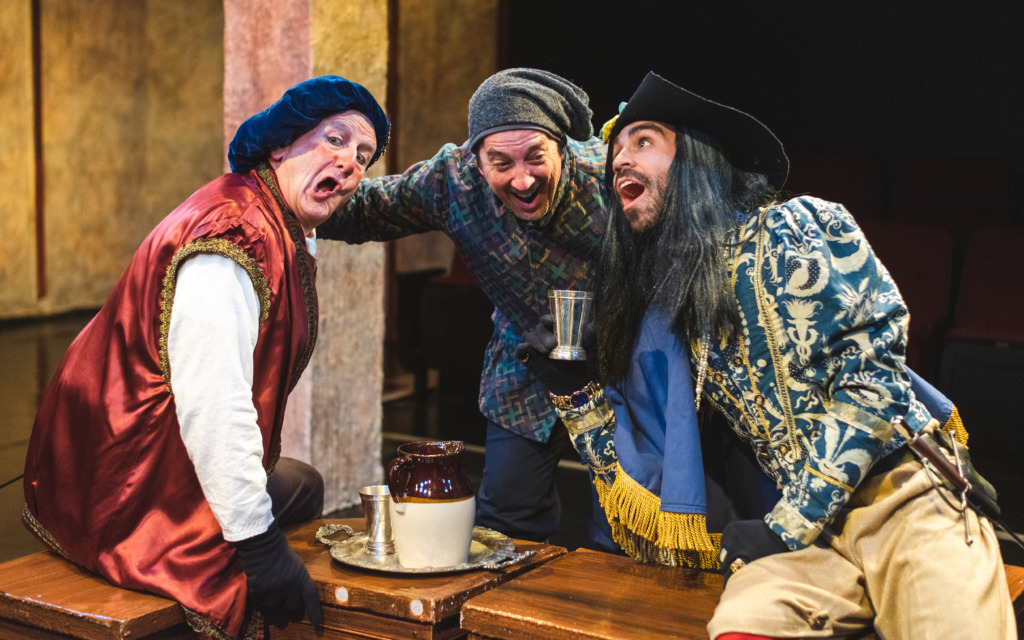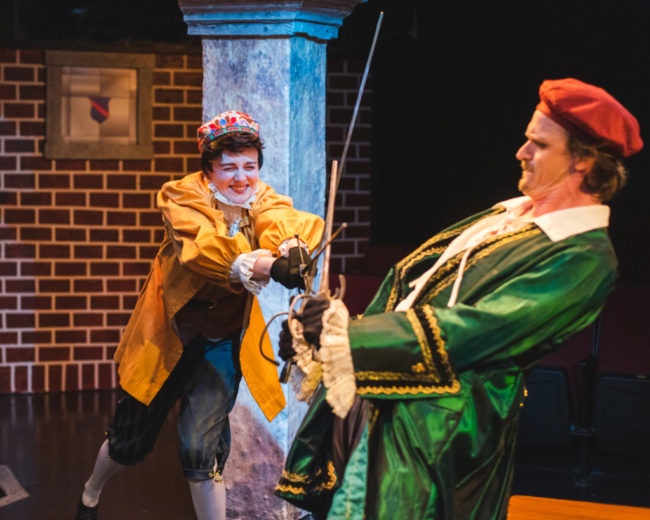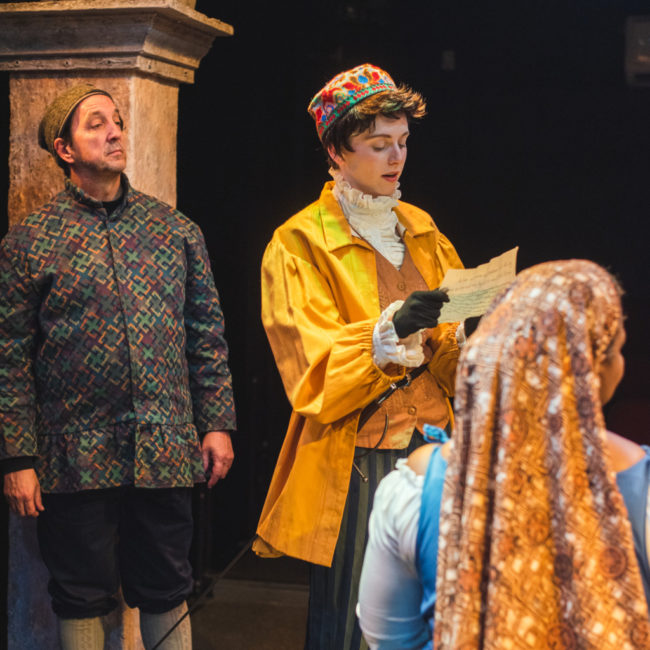In a modern context, the production of William Shakespeare’s works largely hangs upon the performers’ ability to voice these verses in such a way that the audience not only instantly and instinctually understands their meaning, but may also benefit from their specific notes of humor, tragedy, etc. In this sense, Spotlighters Theatre’s Twelfth Night – the classic gender-bending romantic comedy – is a decidedly mixed bag.

The older generation of performers seem to know exactly what they’re doing here, and they sustain the play marvelously: Jim Knost’s Feste the Fool, Frank Mancino’s Sir Toby Belch, and Jeff Burch’s Malvolio are the lifeblood of this production with their charisma, chemistry, and overall mastery of the language of The Bard. Without their wit and rapport, this play would be a disaster. They are likewise supplemented by the delightfully self-aware himbo antics of Charlie Jenkins as Sir Andrew Aguecheek. These four gamely shoulder the entire weight of this production like pallbearers, but that’s nothing new – these have always been the most memorable among the characters and performers of this piece, in the same way that many Shakespeare plays gave far more meat to the character actors than those in the leading roles.
Evangeline Ridgeway as Viola is a peculiar paradox. She has a good mouth, mind, and heart for Shakespeare, lending a sort of young Carrie Fisher earnestness to it – complete with sharp wit and good comedic timing. Even so, her performance is so close-up in its intensity that it seems more suited for camera than stage. The Spotlighters Theatre is a small venue indeed, yet she still doesn’t project herself to the necessary volume for the space. She relies on weeping a bit too often with this character, but overall, she has a smartness of delivery that befits a good romcom. One wonders whether her talents are best applied here, however.
Just as the affections of this piece are misapplied amid its characters, it’s also true of some of the casting here. Given how much more volume and expression the major role of Viola requires, it’s hard not to imagine Kaitlin Ruby in that role, though she was cast as the courtier Fabian instead. She has a far larger stage presence, her face is more comically expressive, and she seems more comfortable making Shakespeare’s inflections not only accessible, but openly hilarious. (To say nothing of the fact that she looks far more like Thomas Bowers’ Sebastian, whose guileless performance as Viola’s twin brother is sublimely suited for this role.)

In this same way, Brian Krasczewski seems far less compatible with this role as his understudy Richard Culp Robinson, who portrays the freebooter Antonio. Krasczewski grandly recites his lines rather than lending the proper weight or meaning to them (the worst mistake an actor can make when attempting Shakespeare, especially when he’s got so much comedic gold to work with), whereas Robinson’s delivery is soulful and properly paced.
It is unfortunate but necessary to point out that Sharon Carter Brown, who portrays Countess Olivia, obviously and awkwardly reads her lines during her scenes. It would be cruel to deny that the era of COVID has forced us to accommodate and be respectful of the fact that performers have had to deal with the mental handicaps of prolonged isolation/hiatus and brain fog, and instances of that onstage can surely be ignored here and there. However, this is a play, not a staged reading – a modicum of memorization is essential, and Brown’s inability to be off-book without being wholly obvious about it hugely affected our ability to be invested in the production, since Olivia is one of the main characters. Given the fact that Margaret Masucci is listed as the understudy for this role (and that she lends a snide understatement to her performance as courtier Valentine), one cannot help but wonder how much better it might have been if she had been permitted to play it.

The fencing choreography of Brandon Richards is somewhat lazy, particularly given how much tighter and more comedic its beats might have been. The costumes of Julia Golbey, Claire McCaulley, and House of Bankerd were quite delightful, and the scenic designs of Alan S. Zemla were wonderfully understated and well-suited to the intimacy of the space. Most of all, the musical interludes of Director Michael Blum are nicely harmonized and neatly-applied.
In short, although there are numerous elements of this production which are worth seeing, the overall spectacle is largely blunted by the parts which reduce it to an amateurish endeavor on par with half-baked community theatre.
Running Time: 2 hours and 30 minutes with one intermission
Twelfth Night plays through November 13, 2022 at The Audrey Herman Spotlighters Theatre— 817 St. Paul Street in the historic Mount Vernon neighborhood of Baltimore City in Maryland. For tickets call the box office at (410) 752-1225 or purchase them online.
